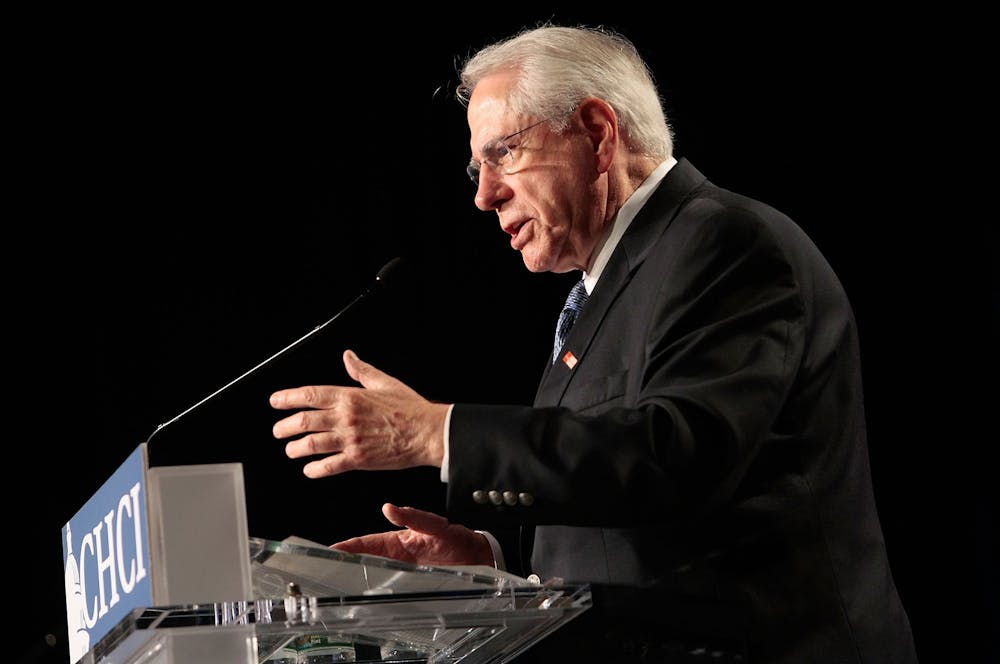Though former Vice President Joe Biden has now become the presumptive Democratic nominee, the party's primary was not without its twists and turns. One notable facet of the crowded race was the rise and fall of many lesser known candidates.
From the zany quips of spiritual leader and author Marianne Williamson to the Iowa caucus victory of former South Bend mayor Pete Buttigieg, and from the unexpected dedication of Andrew Yang’s online fanbase to the $200 million spent by billionaire Tom Steyer to fund his own campaign, many candidates rose from obscurity into political relevancy.
For every headliner, there were multiple candidates who weren’t quite able to grab people’s attention. Lacking recognition, these candidates unceremoniously dropped out of the race before making a big splash. Let’s give some of them attention.
As IU fosters a culture of activism, these smaller candidates can impact the next generation of political ideas. Andrew Yang’s universal basic income started out as a fringe idea, but now we are seeing support from both Democrats and Republicans to temporarily implement a form of this program as a means of financial relief during the COVID-19 pandemic. Shining a light on a few of these smaller candidates allow for activists to explore these fresh, new ideas.
One of these candidates is former Rep. Joe Sestak, D-Penn., who has had a decorated career as a public servant. A three-star vice admiral and two-term U.S. representative, his political career was put on pause after he lost a bitterly close race to represent Pennsylvania in the U.S. Senate by just 2% of the vote in 2010. After running for the Senate a second time and later becoming the president of FIRST Global, a nonprofit promoting STEM education, Sestak decided to run for the 2020 Democratic nomination for president.
Evan O’Connell, Sestak’s communications director, joined the campaign at its June inception and was there through its highs and lows. O’Connell was a legislative intern for Sestak for a semester in college and had firsthand experience with the politician.
“On a good day, you get around six hours of sleep,” he said.
Unfortunately, nothing brought a breakout moment for Sestak’s campaign. The closest he came was on the heels of the campaign’s walk across New Hampshire and its one and only TV ad buy in the state. Afterwards, Sestak registered 1% in an October New Hampshire poll, though even this small opportunity faded quickly.
The odds weren't in Sestak's favor either. Regarding the size, O’Connell said the campaign’s staff was probably one-third of the size of a usual campaign’s.
“You could fit us into a car,” he said.
O’Connell also described Sestak as the “scrappy, insurgent anti-establishment guy”and a man who “marched to the beat of his own drum.”
With Sen. Bernie Sanders, I-Vt., Yang, and, for at least a brief moment, Williamson dominating much of the news media as de-facto anti-establishment candidates, Sestak’s late entry to the race in June ultimately made it difficult for him to make his case to the nation. He dropped out in early December.
Likewise, another candidate who never reached a wide audience was former Sen. Mike Gravel, D-Alaska, who ended up dropping out of the race after not reaching the polling qualifications for the first debate.
The 89-year-old’s campaign was particularly unusual because it was run by a pair of teenagers, who reached out to Gravel via phone call and encouraged him to run. After its demise the teens founded The Gravel Institute, a leftist think tank focused on “ending the American empire,” “reforming our democracy” and working to “end injustice and suffering.” The campaign, which has an incredibly active Twitter account, also endorsed Sanders after Gravel dropped out in August 2019.
Ultimately, whether it be O’Connell or the Gravel teens, a common theme became apparent with these small campaigns: the staff truly believed in the candidate’s cause. When asked a single word to describe the Sestak campaign, O’Connell said “plucky.”
That's a great way to describe the good majority of these campaigns. When adversity faces us head on, and the odds are stacked against us, it's important to persevere and make sure that our voices are given at least some chance to be heard. Who knows how far a candidate or their ideas may go? The future platform of a national party might even change from it.
Maximilian Sandefer is a sophomore studying political science and Spanish at Indiana University. He is an outspoken progressive who also enjoys an occasional iced tea.





